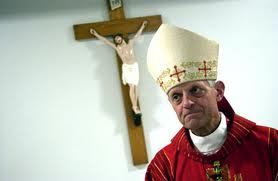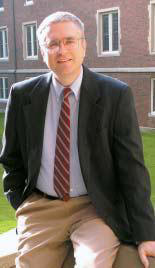Update Below from Ed Peters.
Neumayr’s Article begins:

“Since he won’t control the sacraments, the Church’s enemies will.
“The road to hell is paved with the skulls of bad bishops. That’s a slight paraphrase of a line from St. John Chrysostom.
“The saints of old warned bishops to choose holiness and orthodoxy over the blandishments of the “world.” Many bishops today in America choose the good opinion of worldly elites over orthodoxy. These cufflinked cardinals worry not about punishment in the next world but slights in this one. They desperately crave the approval of America’s movers and shakers and live in dread fear of losing it.
“What will the Pretty People think if I withhold Communion from powerful pro-abortion Catholic pols? Will the Washington Post editorialize against me? Will I lose my place of honor at posh parties? Will my dissenting priests think ill of me? Will I be scorned at the next USCCB meeting?

“But it is the policy of the Roman Catholic Church. If a person is not in communion with the teachings of the Church, said person should not receive Communion. Period. Canon law makes this explicitly clear. If you don’t believe me, ask the head of the Vatican Supreme Court, Cardinal Raymond Burke. Though most of his colleagues seem to ignore his stance, he has said for years that canon law places a grave burden on priests to protect the sacraments from defiant sinners. According to Burke, canon law is not a whimsical option for hardline eccentric priests but a moral duty which “obliges the minister of Holy Communion to refuse the Sacrament” to those in “manifest grave sin.” ……..”
Read the whole article HERE

-
Save
Dr. Ed Peters, Canon Lawyer Responds:
George Neumayr’s double-barreled blast of Cardinal Wuerl was very wrong, by by Dr. Edward Peters
George Neumayr is a terrific observer of things Catholic, and an excellent writer to boot. But everybody has a bad day from time to time, and today must have been Neumayr’s. Unfortunately, the object of his ire is not just a brother in the Lord but a major prelate governing a very important American see. Little, (frankly, nothing) in Neumayr’s on-line editorial today for American Spectator will help Cdl Donald Wuerl do a better job for the Catholic Church in Washington DC.
Amid his obvious anger, sacrcasm, and numerous ad hominem shots, Neumayr blasts Wuerl’s stance on Rep Nancy Pelosi with the same trigger pull by which he blasts Wuerl’s (sic: so far, Wuerl’s subordinates) response to the Barbara Johnson case. But the two cases differ markedly and, in going after an episcopal p.o.v. that deserves informed criticism, Neumayr took out a stance that deserves our support.
There is hardly a higher-profile Catholic in America who, more often than Pelosi does, expressly invokes the Catholic faith to defend the most consistently anti-…, anti-…, anti-almost everything that Catholics in public life should oppose about the culture of death. I have repeatedly called for Canon 915 to be invoked against Pelosi (for starters) to deny her holy Communion for so long as she falls afoul of what I think is every canonical aspect of “obstinate perseverance in manifest grave sin”, this call being made for her welfare and for that of the wider Church. Moreover, I have expressly argued that Wuerl’s interpretation of Canon 915 and his subsequent reticence to invoke Canon 915 as I think it should be invoked against Pelosi, is wrong.*
“Now, if Neumayr had made only that point—and had he written in a tone consistent with the admonition in Canon 212 § 3 to express views in the Church “with reverence for pastors and … attentive to the dignity of persons”, I would be applauding his words (as I usually do when I read Neumayr). Instead, Neumayr drew the same bead on Wuerl for his inaction in the Pelosi matter that he drew on Wuerl (or his subordinates’) actions in the Johnson matter. To repeat: in re Pelosi, I think Wuerl’s thinking is remiss and that holy Communion should be withheld from her; but in re Johnson, I think the Archdiocese of Washington is right and holy Communion should not have been withheld from her that day…………”
Read Dr. Peter’s whole response in defense of Cardinal Wuerl HERE
Dr. Peters’ Follow up:
Neumayr is making a bad situation worse
by Dr. Edward Peters
It’s one thing to feel angry. But it’s another thing to write angry. And George Neumayr is writing angry.
Last week Neumayr fired off a sustained and mean attack on Cdl. Wuerl (my response here). To no one’s great surprise, Wuerl’s people complained (albeit privately) to Neumayr’s boss—you know, sorta kinda exactly the way people complain to Wuerl’s boss in Rome. All the time. Now, it might not be my way of doing things, and it might not even be Neumayr’s, but, c’mon, complaints to editors about their writers’ opinions are as old as the press itself. Writers who work, by their own choice, in the public eye, should account complaints about their writing as a fact of life. At the very least, they shouldn’t respond with a follow-up diatribe about, of all things, how “notoriously thin-skinned” other people are!
Dark days (like the ones we live in now) occasion hard cases (like the Guarnizo case, which set off this conflagration), and hard cases, in turn, make bad law (like what defenders of Guarnizo’s decision would erect to justify his action, paying little heed to how their rules would impact other cases). But I think that dark days, hard cases, and the threat of bad laws, call for greater clarity of analysis, not less. And anger does not lend itself to clarity of anything.
But enough with the fraternal correction.
Neumayr has now publicly and repeatedly accused the archbishop of Washington of, among other things, “pandering to the enemies of the Church”, of “expos[ing] the Holy Eucharist to sacrilege”, of “hand[ing] a propaganda victory to forces of secularism that seek to destroy the Church in America”, and of “capitulati[ng] to … the atheistic agitprop artists of the age.” I think such words run plainly afoul of Canon 1373 which threatens censure against “a person who publicly incites among subjects animosities or hatred against … an ordinary because of some act of power or ecclesiastical ministry….” So.
Neumayr’s made his point. Not in a way that is a credit to him, I regret to conclude, but, he’s made it. For that matter, everything that can be intelligently said about Guarnizo case, based on what was known at the time, has been said, and unless and until some new hard facts, if any, come to light, further discussion of this case serves no purpose. + + +



This Post Has 9 Comments
Score it Neumayr 1, Peters Double Zero.
And what aspect of canon law did the canon lawyer get wrong?
The Sarge:
The most important one of all: the final norm of the Code, Canon 1752: “…having before one’s eyes the salvation of souls, which is always the supreme law of the Church.”
May God defend Fr Guarnizo and Fr. Rodriguez, and may God be pleased to make them bishops.
We need them.
Rick DeLano: If the framers of canon law meant us to understand that as long as you have Canon 1752, the other 1751 canons don’t matter, why did they bother to write them?
SDG:
Why on earth would you assume the other 1751 don’t matter?
It would be as absurd as assuming the other 1751 mean the 1752’nd isn’t *the most important*, which is exactly the problem with the disgraceful throwing of Fr. Guarnizo under the bus by certain canonists and chancery officials.
But Neumayr’s article already makes that case, and very brilliantly.
I was hoping that Rick DeLano would take up the above challenge and make a case as to how Dr. Peters was wrong in his reading of Canons 915 and 916 by attempting to refute his points.
I was hoping Bill 912 would read my original response to the challenge, and notice that the challenge involves issues greater than mere hairsplitting regarding interpretations of canon law.
The good news is that Mr. Neumayr gets it, as does the recent contribution at Rorate Coeli.
I invite Bill 912 to examine those and other point-by-point responses to the opinions of Dr. Peters which have appeared in blogposts and combox responses over the last few days.
I think it is fair to say that a very significant number of Catholics are tired of seeing our faithful priests thrown under the bus in knee-jerk fashion, and I expect that this episode might just prove to be of great importance in more effectively bringing this circumstance to the attention of our shepherds.
As for Fr. Guarnizo, he has already made it quite clear (to me, at last) that he acted in the interest of defending the Eucharist (as well as attempting to protect the dissenter against the awful consequences of a sacrilegious communion).
I applaud him, and I have every expectation that the attempt to paint him as somehow derelict by Monday morning legalist quarterbacks will prove……..unprofitable.
Were the criteria of Canon 915 satisfied or not? If they were, then the surpassing importance of Canon 1752 is irrelevant. If they weren’t, a steep burden of proof must be assumed to establish that the practical implications of Canon 1752 in this situation were so great and so incontrovertible as to warrant an extraordinary dispensing with the criteria of Canon 915. Otherwise, in practice anyone can cite Canon 1752 as his justification for dispensing himself of any other canon any time he pleases.
From what I’ve seen, while Dr. Peters has disagreed with Fr. Guarnizo’s actions and his reasoning, he has consistently been charitable in regard to his motives and his canonical standing in a way that I don’t think can be reconciled with the pejorative tenor of the phrase “thrown under the bus.” I note that your general reference to “certain canonists” does not specifically accuse Dr. Peters of such under-bus-throwing.
I’m very sure that, as you say, Fr. Guarnizo acted in the interest of defending the Eucharist (as well as attempting to protect the dissenter against the awful consequences of a sacrilegious communion). If that were sufficient to justify denying communion, Canon 915 could be much shorter: only a single criterion, grave sin, would be required.
No, grave sin is not the only requirement in view. The Canon speaks for itself and I have already pointed you toward a point-0by-point treatment of Dr. Peters’ *opinion* concerning Canon 915’s applicability to Fr. Guarnizo’s case, on Rorate Coeli.
Since it is disingenuous to suppose that grave sin is the only requirement for canon 915, I would simply reply that Dr. Peters’ opinion concerning its applicability to Fr, Guarnbizo’s case is exactly that: an opinion, and an opinion which is not unanimously shared by canonists.
The “throwing under the bus” of Fr. Guarnizo is something that can only have been done by those with the power to do the throwing- that is, by Fr. Guarnizo’s canonical superiors, including those canonists who have apparently misadvised them as to the application opt Canon 915 *and other Church guidance concerning the withholding of communion* for many years.
Even Dr. Peters is at pains to point out that the dereliction of the DC Archdiocese with respect to application of canon 915.
I do certainly disagree with Dr. Peters’ hyper-limiting interpretation of the applicability of Canon 915 as it pertains to Fr. Guarnizo’s incident.
Hope this helps 🙂
Comments are closed.